
Are You Prepared for the Future of Work?
With the rapidly advancing severity of the COVID-19 pandemic, much of the world has been strong-armed into having to work from home. And with that what has long been an experiment by a few, popular with a small percentage of working professionals, has become a reality for most. This sudden change in the way we work has quite possibly changed the future of work for good. And just as profound as the impact on how we work is the resulting impact on how we live.
While most began this work-from-home routine with an understanding that it was a temporary situation, it has significantly affected how we work individually and as a team. It has also had an effect on the family as well as our lifestyles, not only right now but also the time following the pandemic. The future of work and of everything else that most expected to bounce back to normal after the pandemic will be vastly different.
How to prepare for the future of work
1. Significantly more people will work from home more often
The coronavirus has had some unintentional results by making it compulsory for many to work from home in many countries across the world. The present situation is not unlike a dystopian story that nobody thought would be real and people have been forced to make decisions and choices they never thought they would be making.
In a panel discussion on UCLA Anderson’s Virtual Impact Talks, moderated by Professor Terry Kramer, faculty director of the Easton Technology Management Center, including Eleni Kounalakis, California’s first female lieutenant governor and Elana Zeide, PULSE Fellow in Artificial Intelligence, Law and Policy at the UCLA School of Law, Matt Plummer, VP of product strategy at ZipRecruiter talks about how the corporate world is in an almost forced experiment. And while many thought working remotely would take years to figure out, in fact, has been established, with some sense of coherence, almost immediately, which has had a significant effect on the future of work.
So everyone has mixed feelings about this situation. Some are enjoying a break in their routine and being able to spend a little more time with loved ones, while others are frustrated about not having the option to step outside and the sudden loss of a familiar routine. There are more people being surprisingly pleased with the sudden work from home arrangement.
Through a survey conducted by our team, we found that 86% want to continue to work from home 2 or more days every week, and 14% want to work from home permanently. This led us to understand 2 things:
a) For many, this is quite possibly their first experience working from home. The concept is more popular with Generation Y and Z with the shift in the kind of jobs they experience as well as renewed views and ideas on work and work culture. And it is not as popular in the corporate world. So, for those who have experienced it for the first time in a corporate setting have realized that they are able to work from home with little change in the effect it has on their colleagues or perhaps the quality of work.
b) The circumstances have also led many to revisit their priorities. This government-issued sequestering has allowed many to spend more time with their families and perhaps take a much-needed break from their routine. And since work hasn’t stopped, the temptation of the elusive work-life balance presents itself and the question arises of why this arrangement can’t be continued, if only in part, on the other side of the pandemic since work is not really affected.
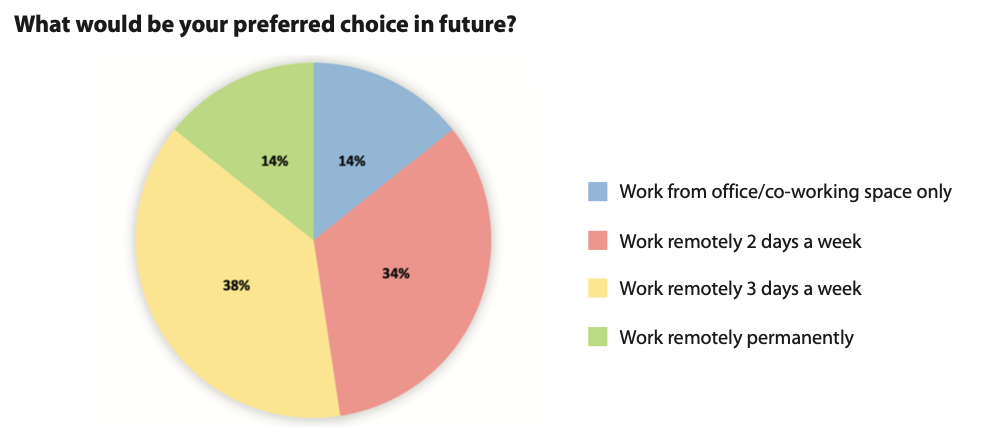 While that result is not entirely unexpected, what does strike as interesting is that only 35% of the respondents said they are more productive at home than at the office and 18% said they are just as productive at home as they were at the office. This number is still significantly less than the proportion of individuals (86%) who would like to continue working from home 2 or more days a week even after the pandemic.
While that result is not entirely unexpected, what does strike as interesting is that only 35% of the respondents said they are more productive at home than at the office and 18% said they are just as productive at home as they were at the office. This number is still significantly less than the proportion of individuals (86%) who would like to continue working from home 2 or more days a week even after the pandemic.
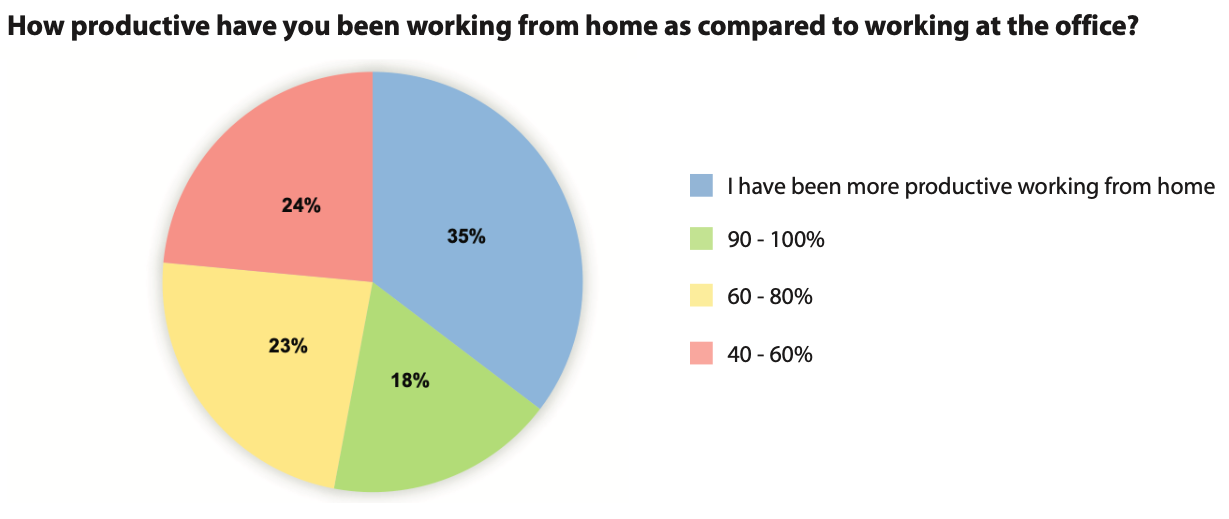 That contradiction reveals the shift in priorities and the mindset of senior executives. As we see it, leaders and companies will have to rethink their work structure, policies, and general framework much sooner than they had expected. Even companies who have been working remotely before the pandemic will have to revise the way they work and communicate with their colleagues.
That contradiction reveals the shift in priorities and the mindset of senior executives. As we see it, leaders and companies will have to rethink their work structure, policies, and general framework much sooner than they had expected. Even companies who have been working remotely before the pandemic will have to revise the way they work and communicate with their colleagues.
In an recent conversation published by MIT Technology Review, Ali Rayl (VP, Customer Experience, Slack) and Rajesh Amandan (CEO, Ultranauts) shared their experiences about how while it is easier to get a sense of the environment of a team by walking around and observing them interact, the virtual shift forces them to be more deliberate in the way that they communicate, plan, and execute.
2. Communication will define winning teams
Communication between teams and team members is going to be a key challenge, especially for those who are not accustomed to this newly enforced manner of working. Our survey results pointed to this key aspect of ‘Work from Home’.
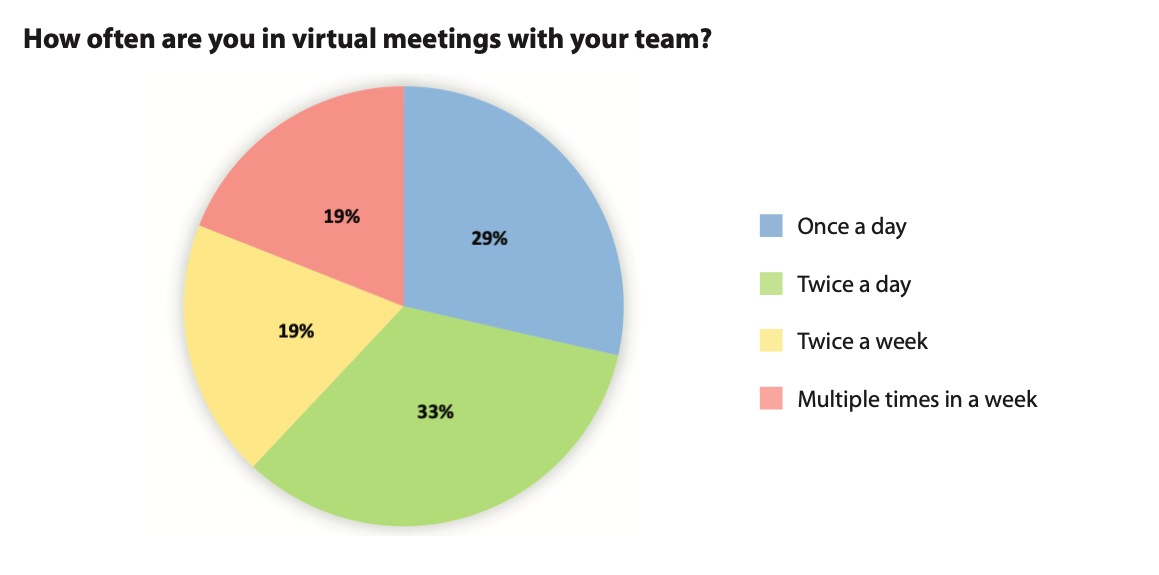 Over 60% of executives are communicating with their teams at least once a day. 29% of the respondents recognize frequent communication with their team as the most important contributor to higher productivity. While the need to communicate seems to come naturally to everyone, it is also clear that quality of communication is a concern area. Just over 30% of respondents believe that lack of dedicated attention from others is the biggest challenge they face in the current environment.
Over 60% of executives are communicating with their teams at least once a day. 29% of the respondents recognize frequent communication with their team as the most important contributor to higher productivity. While the need to communicate seems to come naturally to everyone, it is also clear that quality of communication is a concern area. Just over 30% of respondents believe that lack of dedicated attention from others is the biggest challenge they face in the current environment.
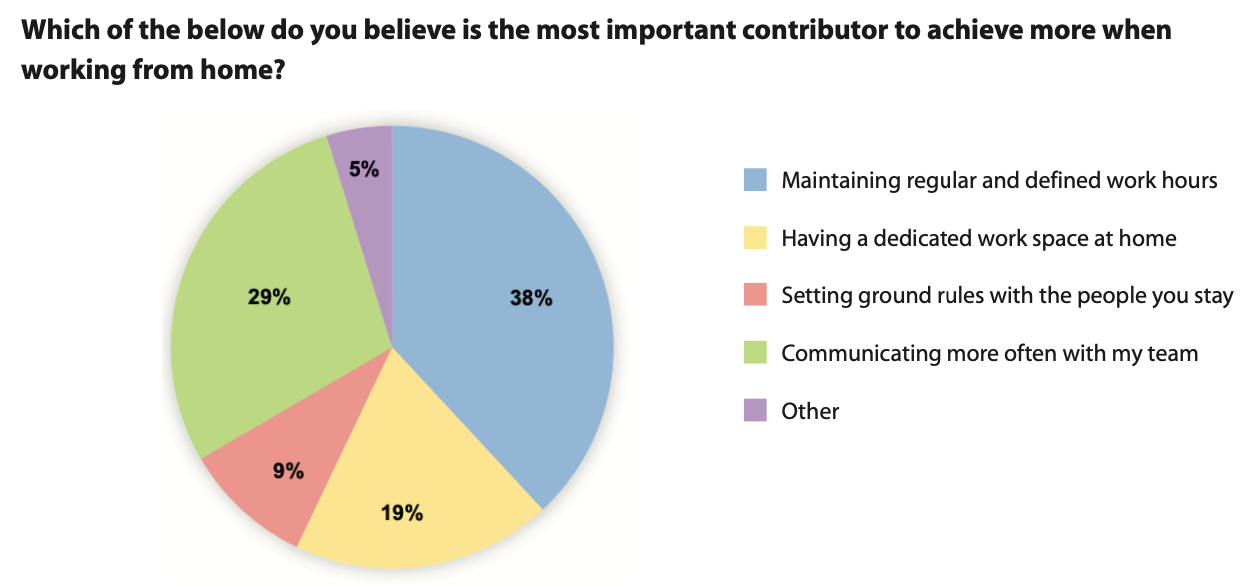 Teams will have to find their footing and device processes to make sure there are no gaps and no space for miscommunication making work from home just as effective. Empathy will become even more important for leaders as we communicate in environments where body language and gestures are not contributing to how we relate to people and the issues we discuss.
Teams will have to find their footing and device processes to make sure there are no gaps and no space for miscommunication making work from home just as effective. Empathy will become even more important for leaders as we communicate in environments where body language and gestures are not contributing to how we relate to people and the issues we discuss.
In an article by Yale Insights, Yale SOM alumni Scott Wharton, who leads Logitech’s video collaboration group, says it wasn’t a hard shift for his team because they had already been functioning virtually. But he didn’t have an appropriate set up at home until just before the coronavirus crisis. And for him, that made all the difference.
3. Corner office, anyone?
It is noteworthy that a very slim percentage of people were challenged by not having a dedicated work space. And only just under 20% believe it to be an important contributor to work efficiently from home. While in reality, it is one of the primary suggestions or tips by many publications to be able to function productively and effectively while working from home. It is also what many experienced work-from-home professionals practice.
As valuable as it might seem, very few individuals will miss the amenities of the office to a point where it hinders their productivity. Even though the novelty of working indefinitely from the comfort of one’s own home might not have waned yet, the ‘comfort’ will continue to play a large role. Also, more than 50% of people have indicated that they are almost as productive or more productive while working from home.
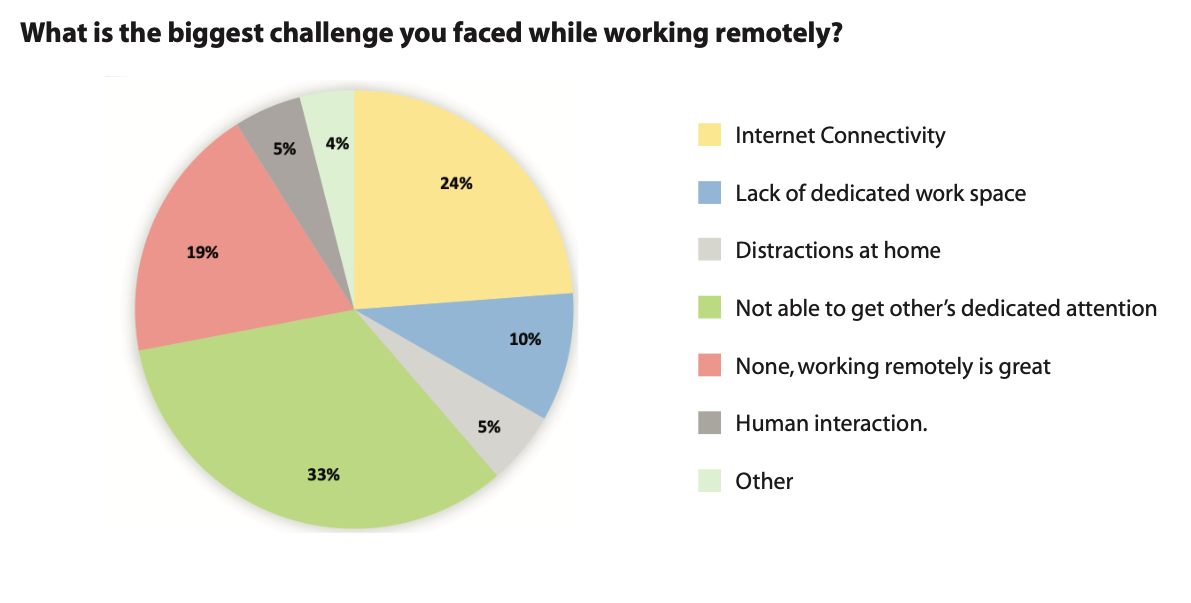 So, although companies spend a considerable portion of their budget on infrastructure, service, equipment, features, etc., it does not measure in value. This could again mean one of two things, or possibly both:
So, although companies spend a considerable portion of their budget on infrastructure, service, equipment, features, etc., it does not measure in value. This could again mean one of two things, or possibly both:
a) The amenities and perks are, in reality, not as valuable to employees as previously perceived.
b) When compared to the advantages of working from home, those amenities and perks don’t match up
If investing large portions of their budget in amenities and equipment is not perceived as a valuable offer, more companies might understandably weave-in the flexibility of working from home and correspondingly save their own overheads on some of the office fitouts. This might mean the future of work will be very different very soon.
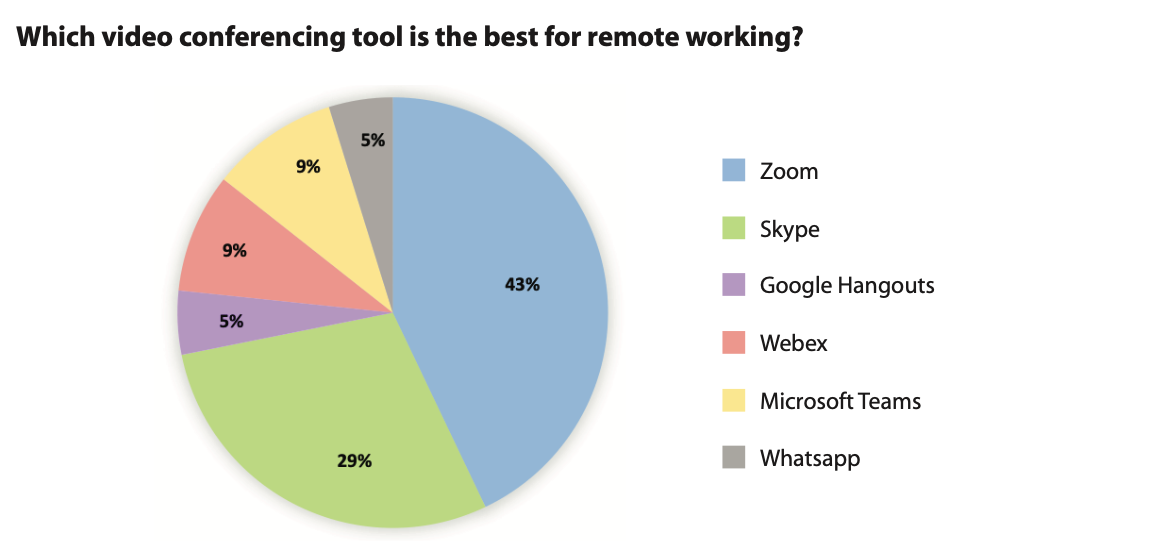 When it comes to tools for communication, there is a very wide adoption of video conferencing tools and individuals have made clear choices based on ease of use, corporate policies, and security. Corporate leaders will have to streamline the choice of tools within their teams, then standardize those choices and practice usage after carefully considering data security, privacy, ease of use, and bandwidth requirements. They will also lead by example in terms of setting meeting norms through these tools such as the use of webcams, the mute feature, the chat feature, and other functionality.
When it comes to tools for communication, there is a very wide adoption of video conferencing tools and individuals have made clear choices based on ease of use, corporate policies, and security. Corporate leaders will have to streamline the choice of tools within their teams, then standardize those choices and practice usage after carefully considering data security, privacy, ease of use, and bandwidth requirements. They will also lead by example in terms of setting meeting norms through these tools such as the use of webcams, the mute feature, the chat feature, and other functionality.
To conclude, the future of work that was predicted to change slowly through this new decade has been revised to change here and now. Much about the way we work is set to change along with the nature of our work relationships, processes, expectations, policies, and even types of jobs. The positive is that work-life balance will possibly improve since many have been forced to realize it. So, while work structures and company policies will undergo change, so will our home experiences and lifestyles.
Recommendations to work effectively from home
While our research and survey revealed a few notable aspects, UC Berkeley’s Chief Innovation and Entrepreneurship Officer Rich Lyons shares 3 insights he has gained through his professional experience that can be applied during the current trying times. With our research and the results of our survey put together, here are our top 4 essential recommendations to make working from home more productive and effective.
1. Adjusting to working from home
The working from home part of the future of work is going to become more prevalent and if your colleagues are choosing to do so, eventually the purpose of going to office will also get diluted. So it will be beneficial to adjust to the new reality by setting expectations at home and work, setting boundaries of work, and finding the new work-life balance to manage stress levels.
2. Stick to a work schedule
Having dedicated work hours and sticking to a daily schedule can up your productivity significantly. For those who are not accustomed to working from home, it’s easy to lose sight of work and nonwork time leading to overlapping. This leads to unfocused work time which leads to lower productivity.
3. Set up a dedicated work space
For many working from home for the first time, a dedicated work area is something that’s missing. But that is important to be able to work efficiently. And while it does not need to be a work desk, it can be a dedicated spot on the dining table, or even a particular seat and coffee table in a corner. Set up your space with everything you need for a regular working day and it will help you focus and be motivated through the day.
4. Make sure to stay connected
Stay connected with your colleagues, preferably through video calls. It is also important to have check-ins that are defined and scheduled apart from unplanned conversation that might be needed. In this unfamiliar situation, it is easy to feel isolated from your regular work routine, so make it a point to communicate with your colleagues on a regular basis, whether you report to them, or manage them, or work alongside them. This helps keep everyone motivated.
For more helpful work-from-home ideas that will aid in boosting your productivity, read With Much of the World Working from Home Indefinitely, are You Doing it the Right Way?

















